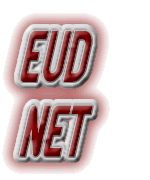|
|
HCI
2003 End User Development Session Papers
|
Authors:
Alistair Sutcliffe, Darren Lee & Nik Mehandjiev.
Title: Contributions,
Costs and Prospects for End-User Development.
Abstract: End-user
development (EUD) has been a Holy Grail of software tool developers
since James Martin launched 4th generation computing environments
in the early eighties. Even though there has been considerable success
in adaptable and programmable applications, EUD has yet to become
a mainstream competitor in the software development marketplace.
This paper presents a framework that critically evaluates the contributions
of EUD environments in terms of the domains they can address, the
modality and media of user-system communication, and degree of automation
in the development process. The second part of the paper describes
a socio-economic model of EUD costs and motivations.
Download the pdf file (187
KB)
|
Authors: M.F.
Costabile, D. Fogli, C. Letondal, P. Mussio, A. Piccinno.
Title: Domain-Expert
Users and their Needs of Software Development.
Abstract: There are
several categories of end-users of computer systems, depending on
their culture, skills,
and types of tasks they perform. This paper recognizes the problem
of ‘user diversity’ even among
people of the same technical or scientific tradition, and focuses
on the study of a specific category
of end-users, that we call domain-expert users: they are professionals
in some domain different
from computer science, who need to use computers in their daily
work. We analyse the activities
they usually perform or are willing to perform with computers and
we identify their real needs of
carrying out activities that result in the creation or modification
of software artefacts.
Download the pdf
file (125 KB)
|
Authors:
Boris de Ruyter.
Title: Challenges
for End-User Development in CE devices
Abstract: To provide
an answer to the potential challenges of technology trends with
regard to user-system
interaction, the vision of Ambient Intelligence is introduced. By
positioning human needs in the
center of technology developments, Ambient Intelligence requires
interactive systems to be
personalized, context-aware, adaptive and anticipatory. Two examples
of such systems and
their need for end-user development are discussed.
Download the pdf file (1.320
KB)
|
Authors: Markus
Klann, Markus Eisenhauer, Reinhard Oppermann, Volker Wulf.
Title: Shared initiative:
Cross-fertilisation between system adaptivity and adaptability
Abstract: In the
present article we investigate a new way of how computer systems
can better meet their users’
requirements. We start from the well -known notions of situation-aware
adaptivity, automatically
carried out by the system, and adaptations, consciously carried
out by the users. We indicate the
shortcomings of both of these approaches and show how they can be
compensated for, at least partially,
by the respective other approach. We argue that such a shared initiative
of both system and
user adaptations, mutually supporting each other, provides a considerable
advantage in keeping a
computer system in line with dynamically changing user-requirements.
Download the pdf file
(28 KB)
|
Authors: Philipe
Palanque Rémi Bastide.
Title: User-Centered
Point of View to End-User Development
Abstract: This paper
proposes a user centered point of view for the definition and the
construction of end
user development environments. Taking, as input, the seven stages
of actions of Norman's action
theory we propose a set of guidelines for easing end user development.
The main criteria for the
language are "types of application covered" and "closeness
of the language with respect to the
application domain". The main criterion for end user development
environment is the "continuous
and permanent feedback" proposed by the environment. These
criteria are then exemplified on
PetShop environment that aims at building highly interactive applications
providing using the
Interactive Cooperative Objects language (an object-oriented, distributed
and concurrent
programming language).
Download the pdf file
(220 KB)
|
Author: Fabio Paternò.
Title: From Model-based
to Natural Development.
Abstract: Model-based
approaches aim to support development through the use of meaningful
abstractions
in order to avoid dealing with low-level details. Despite this potential
benefit, their adoption has
mainly been limited to professional designers. This paper discusses
how they should be extended
in order to obtain environments able to support real end-user development,
by which designers can
develop or modify interactive applications still using conceptual
models but with a continuous
support that facilitates their development, analysis, and use.
Download the pdf file
(390 KB)
|
|
|


